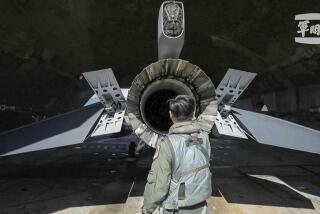THE PACIFIC : Taiwan Still Reaching for a Role in Aerospace : Asia: Two-year effort has had trouble getting off the ground, but officials believe their country has much to offer the industry.
- Share via
TAIPEI, Taiwan — Later it settled on a more modest $260-million partnership deal with British Aerospace.
Both projects fell apart, and embarrassed Taiwanese officials admit they were too ambitious.
Still, Taiwan hasn’t given up on its dream. No longer content with making toys, shoes and cut-rate appliances for the world, it wants to be a player in the aerospace industry.
One important reason is that more Taiwanese industries have been moving to China in search of cheap labor, so a home-grown effort would seem to be the obvious way to fill the gap.
Taiwan’s computer industry has blossomed, but aerospace has not. “Taiwan cannot even make good auto parts, let alone aircraft parts,” says Thomas Chien, general manager of brokerage Wardley James Capel Taiwan Ltd. Taiwan lacks technology, skills and a domestic market, Chien says.
“Besides, many big plane manufacturers are setting up factories in China,” he says. “Taiwan can hardly compete with the mainland on this.”
Nonetheless, Taiwan has for two years doggedly pursued dozens of small-scale projects to set up aircraft maintenance and parts factories in partnership with foreign aerospace companies. It believes that what it lacks in experience and industrial breadth it can make up for with its well-trained work force and a legion of small companies experienced at keeping costs down and adapting to changing needs.
The government says Taiwan’s aerospace industry had $800 million in revenue last year and that revenue will climb to $3.3 billion in 2003.
A recent aerospace show in Taiwan attracted 78 foreign companies, six of which signed deals to co-produce parts or to supply maintenance.
Taiwan has also signed agreements this year with two U.S. companies. It will make small business jets with Swearingen Aircraft Inc. and passenger helicopters with the Sikorsky Aircraft unit of United Technologies Corp.
In February, Bell Helicopter Textron Inc. gave Taiwan’s Air Asia Co. approval to provide maintenance services for its products.
“With extensive and complete manufacturing industry networks from electronics to textiles, Taiwan can provide a one-stop aerospace parts and services shop,” says David Chu, director of the government’s Committee for Aviation and Space Industry Development.
But he acknowledges that right now, Taiwan “is like a talented basketball player who does not know the rules and where to play the game.”
The Taiwan Aerospace Industry Assn. now claims 50 member companies, 15 of which are delivering such items as power suppliers, safety belt buckles, wing parts and meal wagons. Many other companies are awaiting international certification of their products or services.
“Some company board members are starting to feel impatient and are asking whether they made a mistake by going into the aerospace business,” association Secretary General Mike Lan says. “For all this, we maintain that Taiwan needs to build this industry to continue its economic progress.”
Three years ago, Super Precision Heat Treatment Co. was ridiculed for setting up an aerospace business division. But last year, it says, the U.S. Federal Aviation Administration certified it to provide maintenance of honeycomb seals for aircraft engines, and it has received orders from U.S. aircraft engine manufacturer Pratt & Whitney to provide machining on the hollow fan blades of engines.
Safety belt buckles made by Kolik Enterprise Co. are used on some Boeing and McDonnell Douglas planes.
“Taiwan has everything . . . . It has the people who can do the job and the money to do the job. The only thing now is to create a market for their products,” says Chris Cikanovich, vice president of Lockheed Martin International’s Taiwan branch.
More to Read
Inside the business of entertainment
The Wide Shot brings you news, analysis and insights on everything from streaming wars to production — and what it all means for the future.
You may occasionally receive promotional content from the Los Angeles Times.










